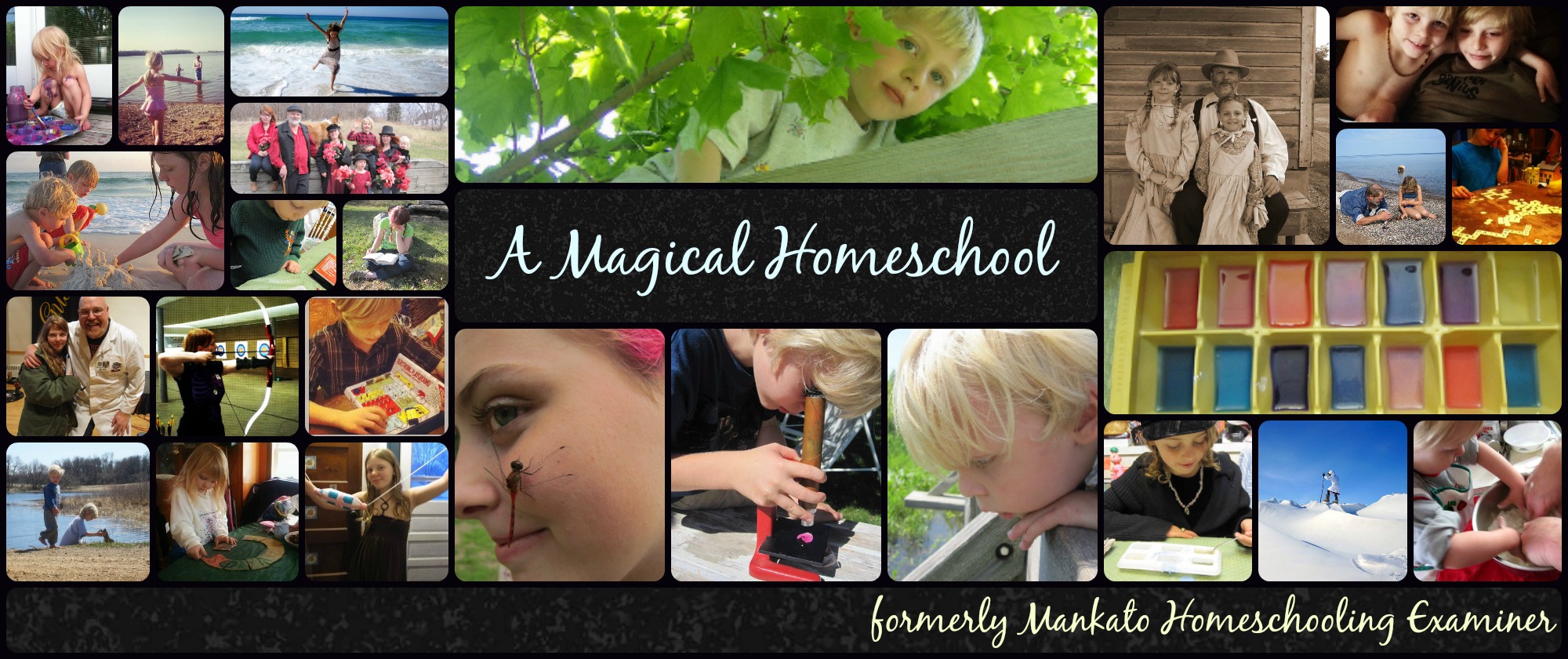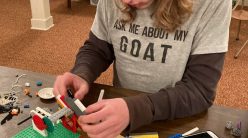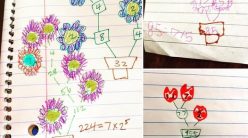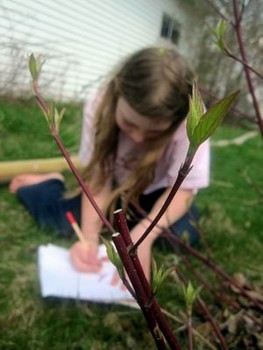
All five of our homeschooled kids are now great spellers, but they weren’t always great. They learned in different ways that suited them, but in the end they all ended up becoming excellent spellers — without worksheets, drills or a curriculum.
How? It was easier than I thought it would be, once they learned in the ways that suited them.
One thing you must know if you’re homeschooling spelling is that it naturally “clicks” several years after reading clicks. This is absolutely normal! And just as reading clicks at wildly different ages for different kids, spelling clicks at all different ages too.
Our oldest started reading fluently at four but was still spelling atrociously at 8. Playing spelling games and talking about spelling rules and tricks helped there, along with lots and lots of reading, though ultimately time sorted it out the most.
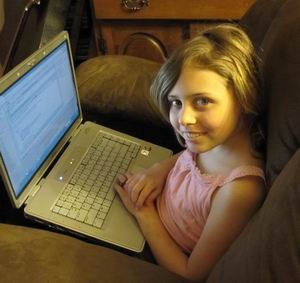
Our second didn’t read until nearly 6 but started spelling well around 8 as well. Writing stories with spell check was a big help for her, as was all the reading she did.
Our son Jack started reading at 6 and was still a terrible speller at 10 or 11, but then he got really good pretty quickly. Texting and spell check helped there, along with being competitive with his siblings when we did spell-offs in the living room. 🙂
Our son Alex was our worst speller. When he was 13, his friend teased him about his spelling and he was so offended that he resolved to get good at spelling. Within a few months, he was excellent (yay for ADHD minds that can hyperfocus when they’re motivated!). He’s now 15 and spells very, very well. It’s a source of pride for him. He just had to get motivated to learn and then it was very fast and easy for him.
Our daughter Fiona, 11, is fantastic speller. She just loves spelling and loves for me to ask her spelling words. We do it while I brush her waist-length hair at night (that takes a long time!) and she happily spells words like ambiguous. She is always sad when we’re finished, which makes me smile. I know that the fact that she is so proud of her spelling is a big motivator for her to want to do more and more. If she had felt “behind” when she was younger and not a great speller, I highly doubt she’d love spelling now the way she does.
Even though all of the kids learned to spell through different things and at different ages, there were constants in our homeschool that helped make it easier for them.
Here are 50 great ways to set kids up to spell well.
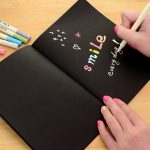
I. Have lots of fun journals, notebooks, colorful pens and other tools around to encourage kids to write. They’ll naturally start to ask how to spell words as they’re more comfortable, and will remember more and more as they write more.
2. Play word games like Boggle and Scrabble. Older kids may especially like Big Boggle, too (affiliate links).
3. Turn on closed captioning while watching TV.
4. Write them letters or silly stories with spelling errors and ask them to circle and correct.

5. Talk about spelling rules like “i before e, except after c” but also about how often they’re not true.
6. Encourage them to write stories, songs, etc. with spell check.
7. Don’t make a big deal about misspellings, especially when they’re just learning to write.
8. Have lots of words in the environment in fun ways with things like poetry magnets and posters.
9. Have them play fun spelling games and apps.
10. Ask them to write things down for you like to-do lists, gift suggestions, and grocery lists, and spell the words for them as you go.
11. Have lots of books in your home. The more they read, the more they will naturally pick up spelling.
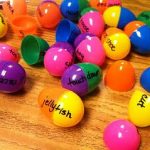
12. Use household materials like bottle caps, rocks and Duplos to make spelling manipulatives to play with.
13. Pass time while driving places or going on walks asking them to spell words. Make some of them silly and keep it light. We used to go until the kids each got 10 right. Only do it if they’re enjoying it though. If not, move on to something else!
14. Show them Free Rice, a website (also available as a free app) that has all kinds of questions in all kinds of topics, including spelling. Each word they get right earns a grain of rice that’s donated to hungry people. The site keeps track of how many bowls of rice kids have earned. My kids loved knowing they were helping people and also loved being able to see how much they’d done. The site auto-adjusts to each person’s level so that it stays challenging but at their level, too.
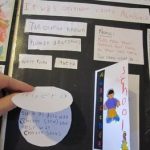
15. Do fun projects like lapbooks that incorporate writing and spelling.
16. Find fun and silly ways to practice spelling words.
17. Watch old PBS shows like Word Girl and Between the Lions that teach spelling in fun ways.
19. Do silly copywork. I love the idea of copywork to help kids improve their spelling and handwriting, but most of it is so boring! I used to write out fun copywork for my kids instead with sentences like, “Help! I have an iguana on my head!” and “My brother is a monkey.”
20. Write with them a lot — leave them notes, text them, etc. My kids and I used to have “mom and me” books where we’d write to each other back and forth. This is a great way for them to see words in print regularly and automatically learn many of them.
21. Show them fun apps that incorporate spelling like Words With Friends.
22. Have lots of words in their environment. I remember learning to spell the word vitamin from seeing it every morning on the milk carton. Labels, food containers, magazines… all of these help kids accidentally learn how words are spelled.
23. Don’t underestimate how much kids learn to spell from gaming. Some video games need you to spell commands right, for instance. They text to others within games. They see some words again and again that they automatically learn. And so on.
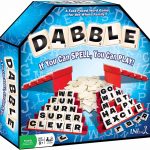
24. Print out things like free crosswords and word searches.
25. Get fun family games that use spelling like Dabble (affiliate link).
26. Make your own story and poetry rocks. Gather a bunch of small, smooth rocks or shells and use a permanent marker to write all kinds of words on them. This is a great way to talk about parts of speech like nouns and adjectives, along with essentials like articles (the, a, an) and conjunctions (and, but…). The more you make the more creative your poems and stories can get! And along the way they’re writing all kinds of words they’re learning to spell.
27. Talk about tricks to help remember spelling. We do this a lot, like I’ll point out that there are two parallel lines inside the word parallel. I tell my kids to say the word Wednesday as wed-nes-day in their heads so they can remember its odd spelling. I tell them “here” is in “there” because here and there go together. I still remember a teacher telling me the way to remember principal versus principle was that “the principal is your pal” and disagreeing with her. 😉
28. Watch spelling bees. They can be pretty fun and interesting!
29. Play games like hangman.
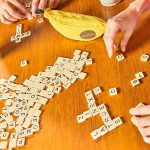
30. Play Bananagrams (affiliate link). This is one of our favorites in our family. We don’t really play it competitively but more as just a fun thing to do together. Before I say peel I’ll often look at my kids’ hands and make suggestions. Some kids like to play competitively and race to win, but we really like doing it cooperatively. Either way, it’s a great way to improve spelling.
31. Get them a pen pal.
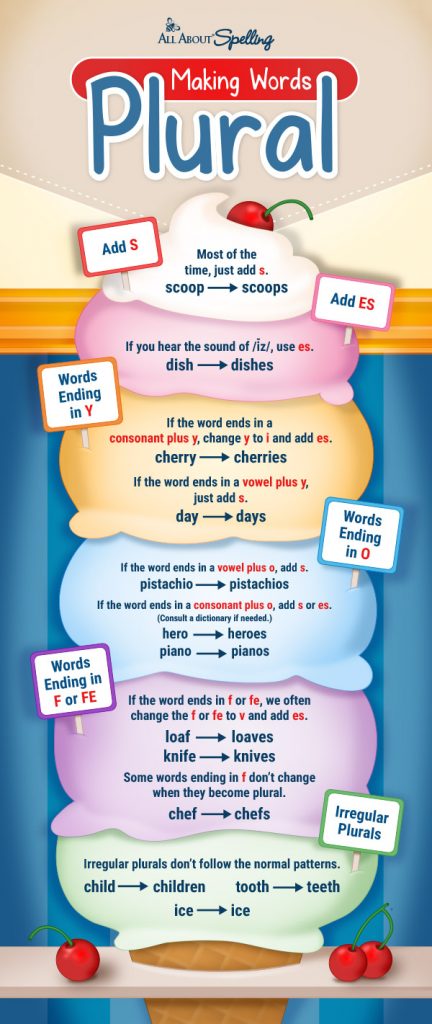
30. Print out helpful spelling posters and printables like this one. They’re good to put on the fridge or wall so kids naturally take in the rules.
31. Have fun spelling manipulatives like letter magnets (affiliate link) for kids to play with.
32. Make up fun spelling games to play together. For instance, use index cards to write a word right and wrong, and have them flip over the one they think is right (which will say so on the back). Have them keep going until they flip 10 right ones in a row, and then they get to do something fun or win a treat. The ones they get wrong go in a pile for next time.
33. Enlist them in labeling things. We do a lot of canning and my kids enjoy helping to label the jars with the ingredients (applesauce, roasted spaghetti sauce, elderberry syrup, etc.) along with the date. This is also great for sneaky handwriting practice. 🙂 They also love to use the label maker to spell out labels for organizing the kitchen, bathroom supplies and so on.
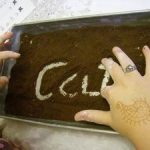
34. Make it sensory. A lot of kids learn better if they’re using their bodies and their senses at the same time. This can mean bouncing a ball while spelling out a word, writing in coffee grounds or flour, or even writing out words on their backs for them to guess.
35. Get them writing reviews. Sites like Goodreads are great places for kids to review books they like (or hate), and they’ll automatically let kids know when they have a word misspelled.
36. Talk about root words, prefixes and suffixes. This really is like giving kids a superpower. Once kids understand how word parts work like psych- and para- and -ology, they can not only figure out how to spell words they may never have encountered before but also to figure out what they mean. There are some great books (affiliate link) that work as a refresher for you or help older kids.
37. Make up silly words together. Once you understand prefixes, suffixes and root words, you can also make up your own words. You can do this for fun by cutting paper into strips and writing parts on them like mort- (death, as in mortician), trans- (across or over, as in transcontinental), anti- (against, as in antifreeze) and -ology (the study of, as in psychology) or just look at lists like this and make them up. Kids will happily come up with words like poopology and antihomework. 🙂
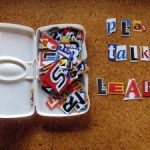
38. Make ransom notes. Cut out words and letters from magazines and give the kids some paper and a glue stick so they can write a story, poem or ransom note with them.
39. Help them set up a blog. Blogging is such a fun and easy way for kids to naturally improve their spelling and writing skills. You may want to have them set it to private and just share the link with trusted friends and family, especially if they are young.
40. Do chocolate chip spelling. My kids used to ask for this and chocolate chip math all the time. 🙂 I used to buy these decadent organic chocolate chips and we’d sit at the dining room table. I’d ask the kids questions and if they got them right they got a chocolate chip (they’d also ask me questions so I could get some!). It was a fun way to have a sweet treat.
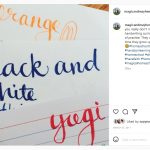
41. Do crafts together that incorporate words. My older kids always loved to do scrap booking, altered books, sign making and other art projects that involved words. They would often copy phrases they liked or make up their own and ask how to spell difficult words.
42. Show kids Schoolhouse Rock videos. They have some great ones on parts of speech like nouns and adjectives that show how all kinds of words are spelled (and teach about their uses while they’re at it).
43. Use their hobbies. Kids will naturally spell when they’re doing the things they love. They can write plant names on markers when they garden, write out recipes they invent when cooking, write up titles and explanations when posting videos, etc.

44. Use free printables. There are lots of sites like this one that have fun printable games and activities you can use for free.
45. Let kids know that you’re not worried. We’ve all known those kids (or have been those kids) who “learned” that they were terrible at something like math and gave up trying. Be sure your kids know that you have all the faith in the world that they’ll eventually be great spellers. Remind kids that people naturally learn to walk and talk at all different ages and nobody says “Oh, that baby was such a late walker that he’s never going to be any good at it.”

46. Make lots of spaces in your home for kids to write. We have chalkboard doors on some of the kids’ room doors (just paint a regular door with chalkboard paint), dry erase walls in the basement playroom (inexpensive washable bathroom paneling), and poster boards that we put up for kids to write thoughts on.
47. Get them resources if they ask for them. While they don’t need spelling curricula in order to be great spellers, some kids like it. Curricula like All About Spelling are good options for kids who’d like them.
48. Do spelling every once in a blue moon. This works well if you’re the “almost unschooling” type but panic every once in a while. We would very rarely do spelling in one little burst and generally cover 9 weeks of spelling in about 20 minutes. The benefit of this way is that you do it so rarely that kids don’t mind, and even like it. You can cover way more than kids do in school-outside-the-home or forced learning because you wait a little longer until it comes very easily and they often think it’s fun since it’s so novel.
49. Remember that not everybody will spell great, and that’s okay. One of my best friends is an attorney who runs a nonprofit legal service. She has a masters degree in English and a father who was the head of a college English department, but she is kind of a terrible speller. She’s incredibly intelligent — spelling is just not her forte. She has learned to use spell check and have others edit her writing. It has not held her back in life in any way! Nobody is perfect at everything. Be sure kids know that.

50. Be patient! Really truly, kids will get better and better as they go. Have faith and remember that they are not learning on an artificial timeline but on the one that actually suits them. Kids learn FAST once they’re ready and motivated.
